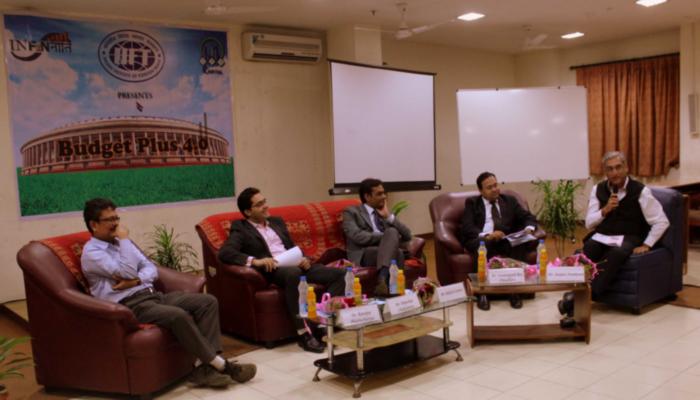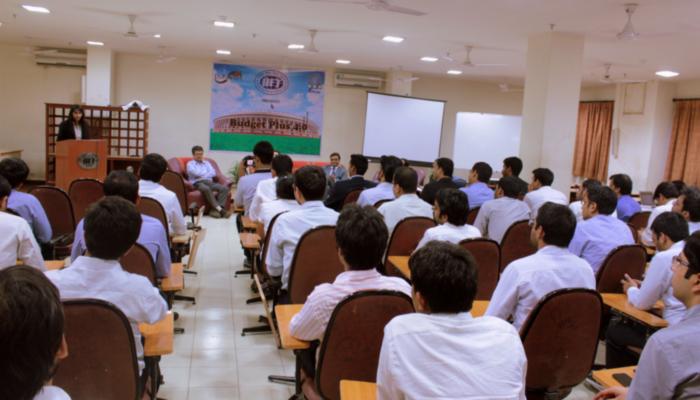As Union Finance Minister Arun Jaitley has rightly said, “Though the Union Budget is essentially a Statement of Account of public finances, it has historically become a significant opportunity to indicate the direction and the pace of India’s economic policy. “ Therefore,Indian Institute of Foreign Trade Kolkata organises an annual event to facilitate a discussion on the Union Budget. The fourth edition of the annual post-budget analysis session, Budget Plus 4.0, was organized at the Indian Institute of Foreign Trade (IIFT) Kolkata. The esteemed discussion panel included Mr. Sanjeev Nandwani, Development Commissioner – SEZs, Govt. of India, Mr. Dipankar Chakraborty, Trade and Investment Advisor British Deputy High Commission, Mr. Rakesh Somani, Director,Eureka Stock & Share Broking Services Ltd., Dr.Ranajoy Bhattacharyya, Professor,IIFT and an esteemeddignitary from ICICI Bank.

From Left to Right: Dr.Ranajoy Bhattacharyya, Mr. Dipankar Chakraborty, Mr. Rakesh Somani, Dignitary from ICICI, Mr. Sanjeev Nandwani.
Mr. Sanjeev Nandwani, Development Commissioner – SEZs, Govt. of India moderated the event and began with the railway budget and the short highlights thereof. Moving over to the talk of the hour, the Union Budget, he touched upon the important propositions included. He welcomed the Rs 72000 crore boost for infrastructure development and the initiatives taken by the government regarding ease of doing business and e-governance.
Anesteemed dignitaryfrom ICICI bank started with his overall opinion on the budget by proclaiming it to be “far from populist”. According to him the recently unvieled budget signals an attempt at consolidation of the fiscal structure, thanks to the current political situation in the aftermath of a clear mandate. He touched upon the apparent success of schemes like the Pradhan Mantri Jan Dhan Yojana which have finally reached the masses, the efforts proposed for improving the ease of doing business, the financial inclusion finally inching towards reality and the subsidies reaching the right pockets through the electronic channels that are to receive a tremendous facelift in the current financial year. He was particularly satisfied with the attempts to simplify foreign investments by diminishing the differences between FDIs and FIIs and making the investments most people’s cup of tea if not everyone’s. Howvever the only dark cloud in the skyline for the banker seemed to be the low allocation of resources towards the recapitalization of public sector. The public sectoris something the private sector players hugely depend on.
Rakesh Somanicommenced his speech by stating that contrary to expectations,budget is not the only important event for Stock market to react to.He appreciated the Indian Government for working towards setting up a functional social security system for all Indians, especially the poor and the under-privileged. He advised the stock investors to approach the budget with the objective of “picking up the sectors which are going to be affected by it.” He prophesied that the sectors which are going to have a positive effect includes the cement,BFSI,real estate and telecom.
Mr Somani also remarked that the banks enjoy the subsidies which act as the “cheap way of enjoying funds” by recounting about a bank in Madhubani,Bihar way back in 1998.The bank had no supply of electricity and was situated 8 kilometres away from pukka road but yet had 10 crores deposited in the saving banks account.He also welcomed the idea of “housing for all” which aims at building 2 crore houses.The most welcoming aspect of the budget according to him was the deferment of GAAR provisions for two years and the declaration that it will be effective with prospective effects will serve to boost the confidence of foreign investors. Market reforms which has been proposed include merging commodities market regulator with SEBI. However, he criticised the efforts of the Government to do away with the autonomy of the RBI, since the institute has acted as a saviour by keeping the economy of India consolidated during the years of recession.
Mr Dipankar stated that the decrease in inflation is merely a windfall and questioned what will happen if the oil prices move up. The actual trends show that the economy is only struggling to break free and the interest payment as a percentage of revenue has shot up. Defending the government for the lack of big-ticket reforms , he said that “Big reforms happen in the parliament and not in the budget”. He questioned the lack of incentives for taking up a career in research and education. Last year’s big bang concept of ‘smart cities ’ has not found a mention anywhere in this budget . The focus on creating ‘employment generators’ rather than ‘employment searchers’ is a welcome move.He concluded by asking why do we not cut down the size of bureaucracy and government expenditure to do away with the leakages in the ease of doing business.
Dr. Ranajoystarted with the social side of the picture and focussed, in intricate details, on the Jan Dhan Yojana and gave the govt a thumbs up on their intiatives towards encouraging savings. And coming from Dr. Ranajoy it means a lot!The professor advocated the need for political economics for a better analysis of the budget and agreed to the general consensus that: if any government dares to plug the leakages within the systen “it would be this government”. “But it will be very unpopular” he quipped in his own inimmitable manner. Dr. Ranajoy drew the attention of the audience towards the fact that FDIs and FIIs are fundamentally different and trying to bridge the differences may not be such a good idea after all.
Mr. Ranajoy championed the effort of the present govt. which has done a good job taking small incremental steps towards change (which requires reading between the lines). He applauded the measures taken to develop infrastructure through the distinctively different means that the present government is employing.Talking about the hustle-bustle over the budget he said: “The budget has also become a cinema”. He drew a frown at the elaborate discussion on the black money issue as a part of the budget speech.

IIFT Kolkata students listening patiently to the speakers
Forecasting an optimistic weather ahead, the event’s host Mr. Sanjeev Nandwani said and we quote: “For the first time, in a very long time, nobody doubts the integrity of the govt. If the intent is clean, a lot of good can come out of it!”
We hope the sentiments remain as high round the year!
Tags: budget discussion IIFT KolkataYou might like reading:
The realms of political consultants !
In today’s world where the pettiest of information related to a politician spreads like fire amongst the voters and where the electoral careers of even the bigwigs can end after the smallest media gaffe, more and more parties are taking help of “specialists” to come up with the optimal campaign strategies. Social media has become an inseparable part of every […]
Beware of FREE !!!
“FREE” is perhaps the most popular word any consumer looks forward to with eagerness. In pure terms of definition, it can be described as a service or product of perceived value is given without the value transaction to the consumer. Then isn’t it a consumer’s paradise? Why should one be beware? Well it is not the consumer who should be […]






























